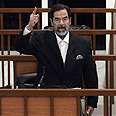
Saddam to be executed 'by year's end'
Iraqi prime minister says appellate court will authorize former president's death sentence by end of 2006. Egyptian president warns that hanging ousted tyrant will cause new wave of intensified violence
"We would like the whole world to respect the judicial will of Iraq," said the prime minister. If the appellate court confirmed Saddam Hussein's sentence, he continued, "it will be the government's responsibility to carry it out."
Saddam Hussein's trial continues as he is tried for other charges, which could also result in a death sentence should he be convicted. All of the charges in this trial are related to Hussein's part in the war against the Kurds in Iraq at the end of the 80s, during which 180,000 people were killed.
In the meantime, it is unclear whether the Iraqi authorities will wait until the other trial is concluded before they carry out the execution.
Egyptian President Hosni Mubarak warned that Saddam Hussein's execution will result in a wave of intense violence in Iraq, and will deepen the rift between Sunnis and Shiites in the country.
Mubarak made these statements in a conversation with Egyptian journalists during his flight back from Asia at the end of his trip to Russia, China, and Kazakhstan.
Mubarak condemns Gaza shelling
During the flight, the Egyptian president responded to the IDF's errant shelling of Beit Hanoun Wednesday and said that his country condemns the Israeli aggression against the Palestinian people and asks that the two sides return to the negotiating table.Mubarak, who has been recently been attempting to implement a number of constitutional reforms in Egypt, promised that he intends to decentralize most of his regime's authority, but in such away that won't affect the executive branch.
Naturally, Mubarak's Asian tour touched upon the nuclear energy program for peaceful purposes that Egypt is hoping to achieve.
In this context, Mubarak said that the countries that he visited warmly accepted Egyptian's intentions in the field of nuclear energy, and even offered to cooperate with them on the issue.
According to Mubarak, Egypt is planning on entering the field in an organized fashion in order to learn all the aspects of using nuclear energy for peaceful purposes.
In the same breath, the Egyptian president denied that any large weapons deals, including acquiring war planes and aerial defense systems, were concluded during his trip as was reported in some newspapers.










